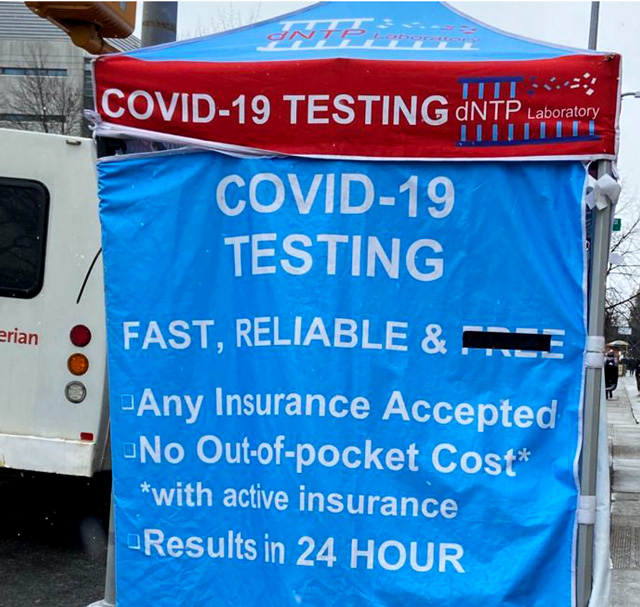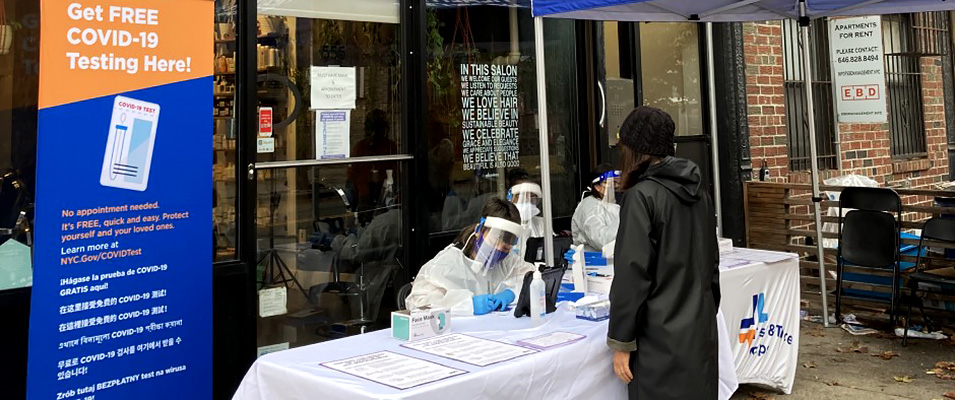By Nathaly Cisneros
The end of the COVID-19 Public Health Emergency will mean changes in hospitals, clinics, and testing centers which will affect many people. On January 30, 2023, the Biden Administration announced that it will be lifting the public health emergency on May 11, 2023, three years after it was first declared in 2020 by the Trump Administration.
COVID-19 testing, at-home COVID tests, and COVID treatment were some of the benefits that have been provided to many people for free. When the public health emergency ends, people will have to pay for these things. “After May 11, 2023, people with traditional Medicare will no longer receive free, at-home tests,” according to the Kaiser Family Foundation (KFF). “Those with private insurance and Medicare Advantage (private Medicare plans) no longer will be guaranteed free at home-tests, but some insurers may continue to voluntarily cover them.”

Photo taken March 14th, 2023 at the corner of W 168th Street and Broadway of a COVID-19 testing location with the word “free” crossed out.
KFF adds that people with Medicaid will have their at-home tests covered through September 2024. After that, such coverage will vary by state. The KFF also mentioned that telemedicine will also require in-person visits after May 11, 2023.
Most people with insurance can still have COVID tests ordered by a health professional but such tests may or may not be free. People with Medicaid will still have access to free tests through September 2024. After that date, individual states will determine which tests are covered and they may charge patients for some costs.
The prospect of the emergency program ending has some Bronx residens anxious. Bronx resident Emely Soto, 23, said she thought most people wouldn’t be able to afford the tests. “I think that’s insane, we should still have access to everything, tests, and vaccines,” said Soto. “I use a lot of at-home tests when I don’t feel comfortable going to a clinic.”
Everyone needs health insurance in order to get the medical care they need to stay healthy. According to America’s Health Rankings United Health Foundation, after the Affordable Care Act was passed there were still around 28.2 million people who still didn’t have insurance in
2021. A 2022 report by the Citizens Budget Commission of New York (CBC) says before the COVID-19 pandemic there were nearly one million uninsured New Yorkers.
They either don’t understand how the enrollment process works, they are unaware of their coverage options, they believe the coverage available is too expensive, or they have a high self-perceived good health status. “Assuming that 2023 insurance rates and distribution will mirror 2019, roughly 345,000 of these will be eligible for but not enrolled in public coverage options like Medicaid,” said the CBC. “Another 421,000 will have access to employer or self-purchased coverage but have not enrolled due to cost.”
The CBC added, “245,000 uninsured individuals will have an immigration status that renders them ineligible to participate in public programs will have an immigration status that renders them ineligible to participate in public programs like Medicaid.”
Bronx resident Becky Arias, a 56 year old home attendant said she thought it could increase the spread of COVID. “I think this will make fewer people want to get tested even if they have the symptoms,” said Arias. “They could have COVID and not know and get the people around them sick.”
The reporting of COVID-19 lab results and immunization data to the CDC will also change according to the U.S. Department of Health and Human Services. “At the end of the COVID-19 PHE, HHS will no longer have this express authority to require this data from labs, which may affect the reporting of negative test results and impact the ability to calculate percent positivity for COVID-19 tests in some jurisdictions,” said the HHS.
Instead the CDC will try to implement voluntary Data Use Agreements, which will encourage states to share vaccine administration data. A medical assistant at City Prime Health said she hopes any changes made to her clinic won’t affect the patients. “I want them to keep having access to anything they may need so they take care of their health, it’s really important. We are here for them.”



